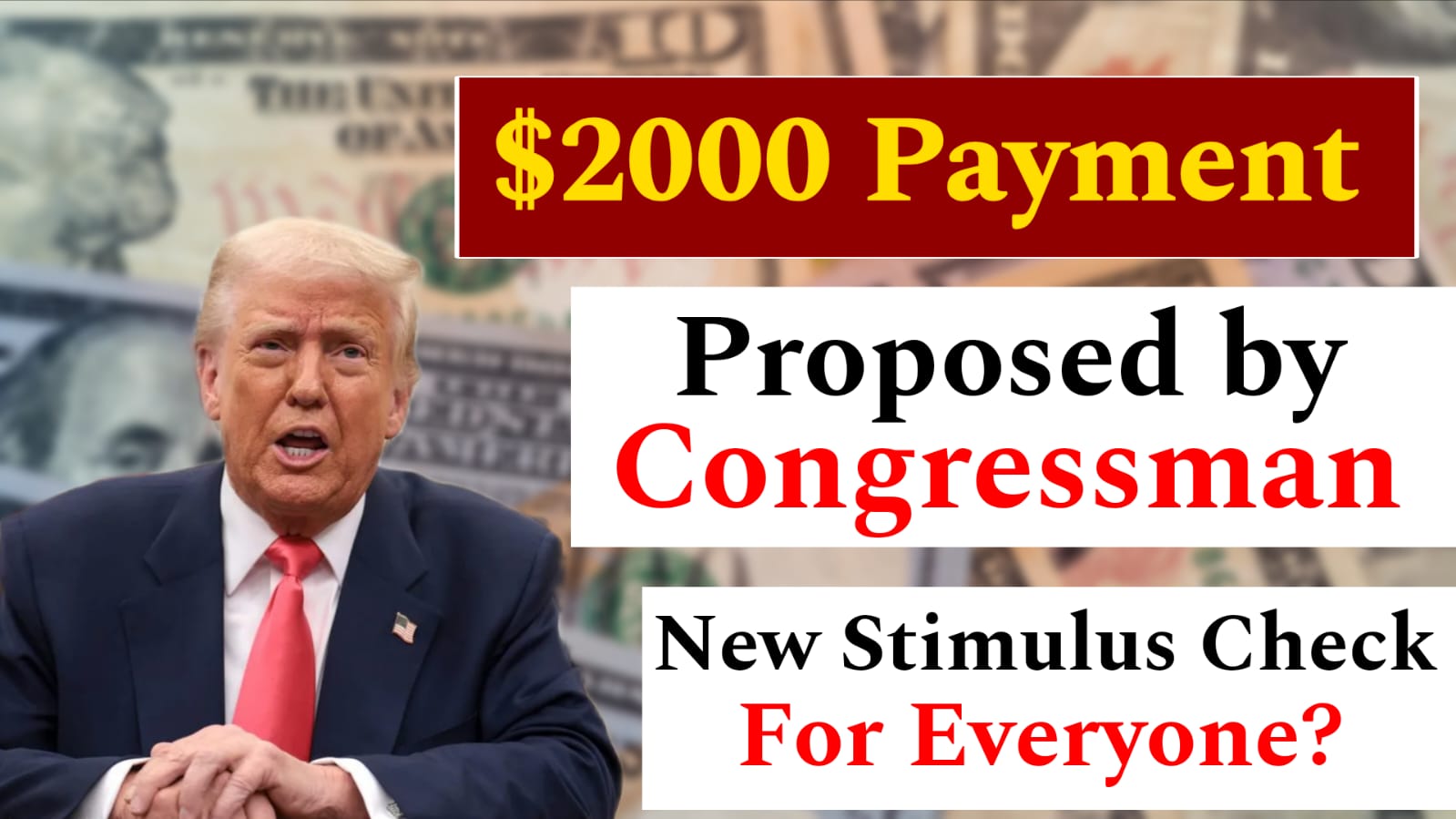$2000 Payments Proposed by Congressman 2025 : As the cost of living continues to rise and millions of Americans struggle with inflation, a new proposal has reignited hope for another round of federal stimulus payments. In early 2025, a U.S. Congressman introduced a plan that could provide $2000 direct payments to eligible citizens. This proposal aims to support families still facing financial hardship due to increased housing costs, food prices, and other essential living expenses. Although the plan is still in discussion, it has already captured nationwide attention.
What Is the $2000 Payment Proposal About?
The proposed $2000 stimulus payment is part of a broader economic relief initiative designed to stimulate consumer spending and reduce financial pressure on low and middle-income households. The idea follows earlier pandemic-era relief checks that provided significant assistance to millions. Lawmakers behind the new proposal argue that despite economic recovery, many Americans continue to struggle with high costs, stagnant wages, and mounting debts.
According to the proposal, each eligible American could receive a one-time payment of $2000, distributed by the Internal Revenue Service (IRS), similar to the process used for the COVID-19 stimulus checks. The bill emphasizes direct deposits as the fastest method of payment, with paper checks available for those who do not have a bank account on record.
Why Is the Proposal Being Discussed Now?
Even though the U.S. economy has shown signs of stability in 2025, inflation remains a key concern. Many households are still recovering from the financial effects of the pandemic, higher rent, and rising credit card debt. The Congressman behind the proposal stated that the new $2000 checks could offer much-needed relief and boost the economy by increasing consumer spending.
Additionally, several states have been offering their own forms of stimulus or tax rebates, showing that local governments recognize the need for continued financial support. This federal proposal would aim to provide nationwide coverage, ensuring that no eligible citizen is left behind.
Who Might Be Eligible for the $2000 Payment?
While the official eligibility criteria have not yet been finalized, the expected qualifications could mirror those from previous stimulus programs. Generally, eligibility could include:
- Single filers earning up to $75,000 per year
- Married couples earning up to $150,000 combined
- Head of household filers earning up to $112,500
-
Individuals who receive Social Security, SSI, SSDI, or veterans benefits may also qualify
Payments would gradually phase out for those earning above these income limits. Dependents could also be included in the payment structure, similar to the earlier stimulus rounds.
How Would Americans Receive the Payment?
If approved, the IRS would be responsible for distributing the $2000 payments. Most recipients could expect direct deposits into the bank accounts previously used for tax refunds or past stimulus checks. Those without direct deposit information on file could receive physical checks or prepaid debit cards.
The process is expected to be quick and efficient since the IRS already has the infrastructure and database from prior stimulus programs. Lawmakers have also discussed the possibility of using an online portal for citizens to update their payment information.
When Could Payments Be Distributed?
At this stage, the proposal has not yet passed through Congress, so there is no official payment date. However, if the bill receives approval, payments could begin as early as mid-to-late 2025. The timeline will depend on how quickly Congress debates and passes the legislation, as well as any potential revisions made during the process.
It’s important to note that proposals like this often face political challenges and budgetary concerns. Some lawmakers may question the funding source or economic impact of another round of stimulus. Nonetheless, the strong public support for such relief measures could influence the final decision.
Economic Impact and Public Response
Public reaction to the proposed $2000 payments has been overwhelmingly positive. Many Americans say that even a one-time payment could help with rent, groceries, or utility bills. Economists suggest that such payments could boost short-term consumer spending, especially among lower-income households who are more likely to use the money immediately for essentials.
Critics, however, argue that additional stimulus could worsen inflation if not balanced by other economic policies. They stress that while direct payments help in the short term, long-term solutions should focus on job growth, wage increases, and affordable housing.
Possible Challenges Ahead
Despite widespread interest, the proposal must go through several stages before becoming law. It needs to pass in both the House of Representatives and the Senate, followed by approval from the President. Political disagreements, budget constraints, or alternative economic strategies could slow down or modify the plan.
Moreover, some experts warn that if not carefully targeted, such payments could benefit those who do not necessarily need financial assistance, leading to unnecessary government spending. Others believe that the simplicity and speed of direct payments make them the most effective form of relief during economic uncertainty.
What You Can Do Now
As of now, the $2000 payment proposal is still under review, and no official application or registration process has started. Citizens are advised to avoid scams and false advertisements claiming to offer early registration or guaranteed approval. The IRS and U.S. Treasury Department will be the only official sources of information once any new payment program is confirmed.
To stay informed, Americans should regularly check updates from government websites such as irs.gov and usa.gov. Signing up for official newsletters or following reliable financial news outlets can also help ensure that no important announcements are missed.
Conclusion
The proposed $2000 stimulus payment in 2025 offers renewed hope for millions of Americans facing ongoing financial struggles. While it’s not yet confirmed, the discussion highlights the continued need for economic relief and government support in challenging times. If approved, this new round of payments could bring meaningful assistance to families nationwide, helping them manage expenses and rebuild financial stability.
Until the proposal becomes law, it’s essential for citizens to remain informed, cautious of misinformation, and patient as the legislative process unfolds. The coming months will determine whether this proposal becomes a reality — potentially marking another significant step in federal efforts to strengthen the American economy and support its people.



